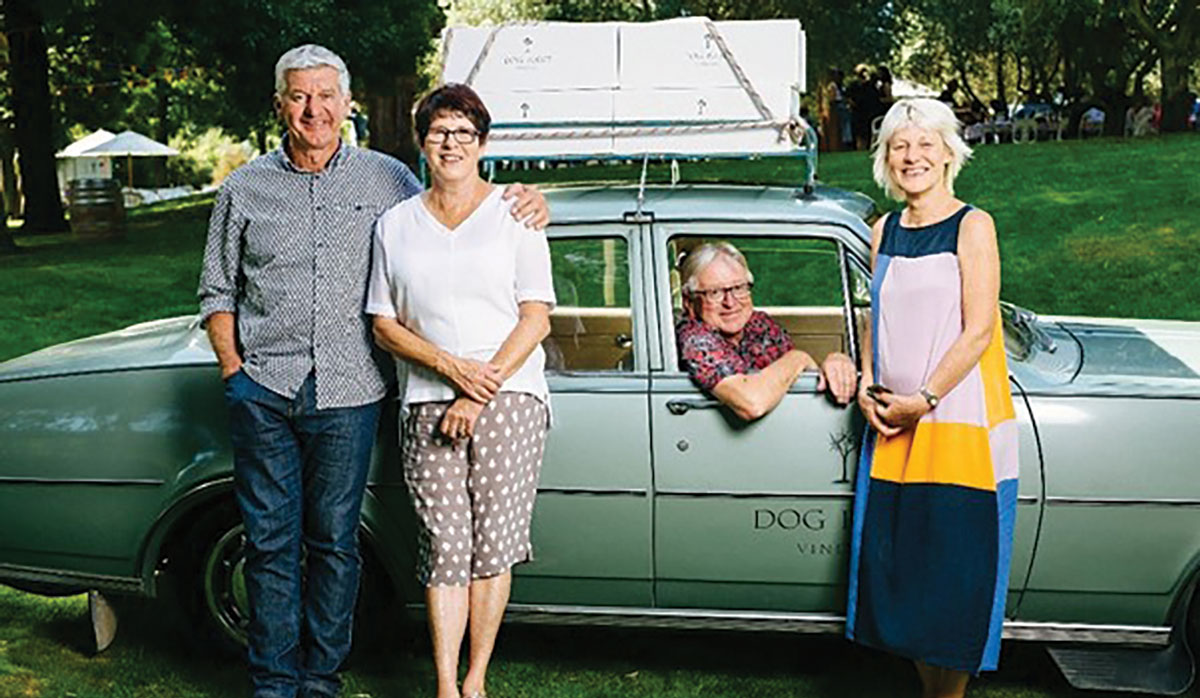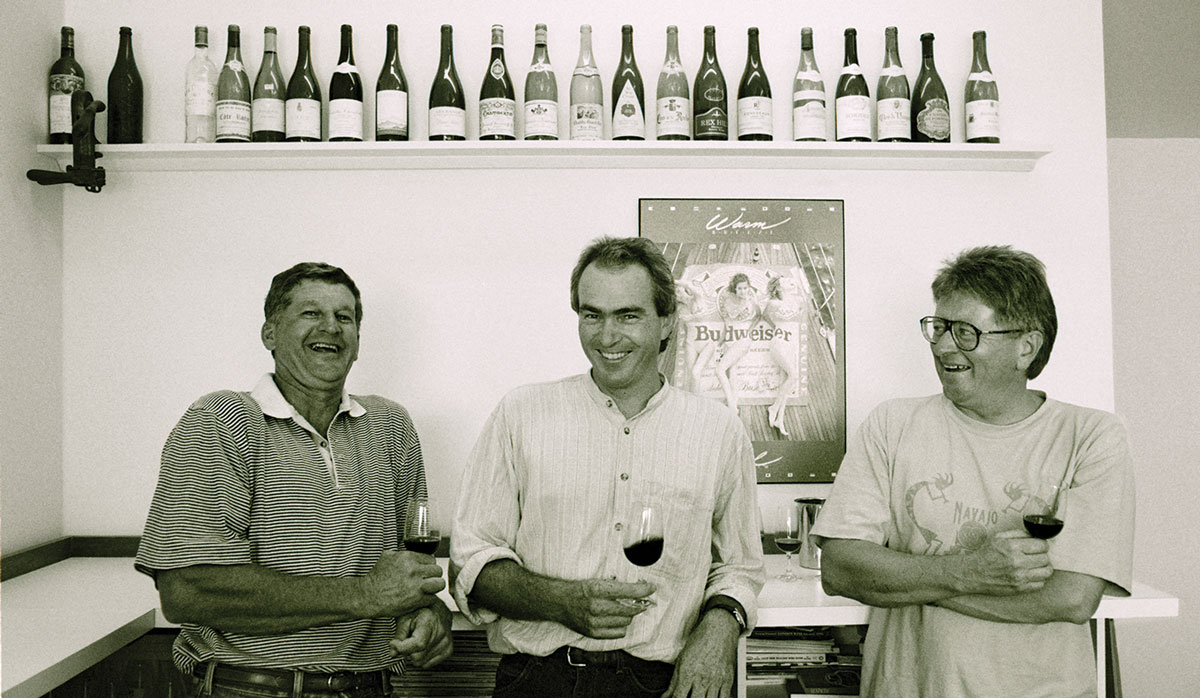Growing Legacy
Thirty-six years after Dave and Chris Macdonald followed a vineyard dream to Marlborough, and 28 years after they named a wine label for their children Blair and Deni, the family is devoted to Bladen, says Deni Hopkins
"The Marlborough wine industry has been extremely kind to me," says James Healy, 32 years after he pulled up in an iridescent green Holden Premier packed with his family and belongings.
James had cut his oenological teeth with Corbans in Auckland and Gisborne, but found his people and place at Cloudy Bay when he started there in 1991. Experimentation was embraced, the work was "vital and free", and his colleagues - including viticulturist Ivan Sutherland and winemaker Kevin Judd - were kindred spirits in crafting wines. "It was just a perfect bunch of people together," says James, who was awarded a Wine Marlborough Lifetime Achievement Award in November last year, for hi extraordinary contribution to the region's wine industry. "If you had an idea, you just tried it out on a few barrels. You just did it. Which fits completely with how I feel. As soon as you start getting to 'we've always done it like that', I feel like shooting myself."
Kevin says James had barely started at Cloudy Bay when he was pushing for wild Chardonnay ferments, akin to what Michael Brajkovich was doing at Kumeu River. "He convinced me to risk a whole bunch of perfectly good Chardonnay juice and put into in barrels and not inoculate it. I thought it was completely crazy. The wines during ferment smelled disgusting and I was convinced it was a complete waste of good juice. Then a year later this amazing, savoury, really interesting Chardonnay evolved in the barrels." Kevin and Cloudy Bay founder David Hohnen were won over, and the next year Sauvignon followed the same process, eventually leading to the iconic barrel-fermented Cloudy Bay Te Koko Sauvignon Blanc. "What we did at Cloudy Bay changed my winemaking," says Kevin from his own label Greywacke, with its dedication to indigenous ferments, including the Wild Sauvignon.
Unconfined by convention, they were audacious with oak, adventurous with wild ferments, and watched ugly ducklings transform to swans, given sufficient time, says James. "The three of us would taste the wine and then extend the idea. Not everything might work, but a lot of them worked extremely well."
 |
|---|
|
Ivan and Margare Sutherland, and James and Wend Healy with the Holden Premier |
Ivan and James took that hands-on, hearts-in, habits-out philosophy when they and their wives - Margaret and Wendy respectively - launched Dog Point Vineyards in 2004, with a Sauvignon Blanc and three barrel fermented wines – Pinot Noir, Chardonnay, and the Section 94 Sauvignon Blanc – all made with natural yeasts. When the time came to share those wines, the Holden Premier took to the road again, with Ivan and James touring the length and breadth of the country, wide white boxes of wine strapped to the slim roofline of the striking car, its doors now adorned with the tī kōuka (cabbage tree) of Dog Point Vineyards.
James has been a “behind-the-scenes” contributor to New Zealand’s wine industry, with an enduring impact, says Ivan, fondly recalling the first decade of Dog Point, when he and James managed everything in the cellar, from cleaning floors, tanks, barrels and drains to endless forklifting. “It was just the two of us and it was wonderful,” he says. “He has a great sense of humour I have been very fortunate to work with him for many, many years.” James marries his “huge” wine knowledge with a diligent work ethic, getting on with the job in a quiet and humble way, Ivan says. “He has never sought recognition.” But he has nonetheless gained it, earning respect in New Zealand and internationally.
It’s a work life James has loved, but not the one he anticipated when he started studying biochemistry at Otago University, considering wine to be cheap alcohol. As he progressed in his degree, James was influenced by a genetics professor who was passionate about wine. “Once you got to about third year in the biochemistry department he looked around and spotted people he thought might have an interest in wine.” James was invited to a tasting of special wines – mostly from France, occasionally from Germany – that transformed his view and shifted his plans.
On completing his postgraduate studies, James and Wendy moved to Auckland, where he set about getting a job. “I wrote letters to every single winery I could find in the yellow pages… I got a letter back from Joe Babich, and one from Peter Hubscher, and one from George Fistonich. And then I got offered a job at Corbans.” He started in the cellar and after a couple of years moved up to quality control manager.
James was exposed to Marlborough fruit from 1983, when Corbans began to truck their grapes to the Gisborne winery, and found flavours of the subsequent wines astounding. “I couldn’t believe that a grape could make such a massive difference. After that I gradually just thought ‘that’s it’.” In 1990 James “struck at the right time” when he asked Kevin, Cloudy Bay’s founding winemaker, if there were any jobs to be had and received an offer to join. “We just packed everything up and moved down.”
More than three decades on, James has made an indelible mark on the region, through extraordinary wines, knowledgesharing events, and the mentoring of winemakers. In 2018 he became a founding member of Appellation Marlborough Wine (AMW), which offers a safeguard of the provenance and production values of accredited wines. It also casts a halo over the region as a whole, giving Marlborough more credibility, he says. “If you look around the world at any places making wine successfully for a long time, they have all introduced some sort of a system that when the bottle has a logo on it, it’s a guarantee of what’s in it.” Wine is about people, he adds. “No people, no wine. And the human desire is to always do something; to take it and explore it and do it better. This whole AMW is just one step in that process.”
 |
|---|
|
Ivan Sutherland, Kevin Judd and James Healy. Photo by Jane Adams. |
Looking back at his wine career, James notes there are no single stand out moments, but a swathe of them. “A highlight was getting into the wine industry in the first place. A highlight was falling in love with wine in the first place. A highlight was being able to move and work at an iconic winery in Marlborough. A highlight was starting Dog Point and having the whole damned thing work. There’s no one thing.”
Another highlight is the work James and Wendy do now, helping their daughter Sophie and her husband Mark McGill, the founders of Cider and Chardonnay producer Abel, with a winery, cidery, and 5-hectare Chardonnay vineyard on 30ha of beautiful country in Tasman’s Upper Moutere. For James, who’s long loved making Chardonnay, the opportunity to delve into the unique fruit of the Moutere Clays, proven by the likes of the Finns at nearby Neudorf, is an excellent next step in the road trip. “There’s something about the fruit intensity,” he says. A few years ago James and Wendy moved to Nelson to help in that endeavour. The Holden, however, remains at Dog Point.
Desert Island Wishlist
Wine - Something from Roulot (although that might make it more difficult to get hold of hmmm)
Meal - Confit duck
Album or Podcast - Difficult... perhaps Elbow?
Book or Magazine - Flashman series
This story ran in the January 2024 Winepress magazine, and is republished with thanks to Wine Marlborough.

Trade is important to our industry, whether it’s because 90% of our wine sales are in international markets, because of…

The end of the year is fast approaching, so here are some thoughts on a few of the significant developments…
Jimmy Stewart is quite literally chipping away at circularity.
A Wine Marlborough Lifetime Achievement Award is “very premature”, say Kevin and Kimberley Judd, nearly 43 years after they came…
Wine tourism has evolved into a sophisticated, diverse and resilient part of the New Zealand wine sector's economy. Emma Jenkins MW talks…